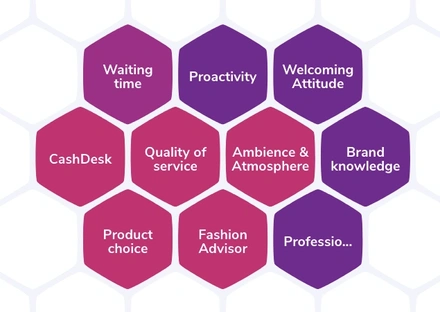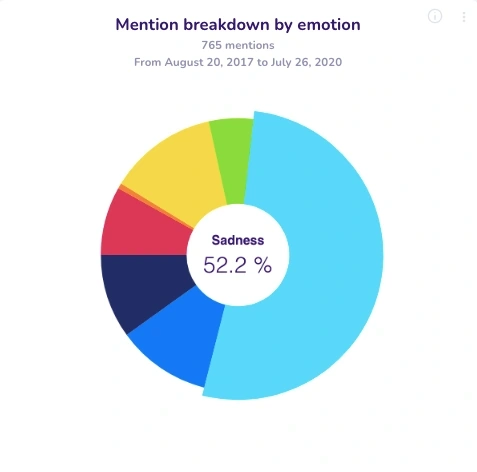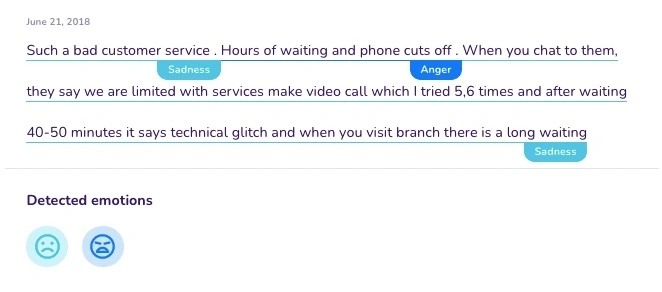EMOTIONS: THE SECRET INGREDIENT TO SUCCESSFUL CUSTOMER EXPERIENCE
Published on January 13, 2020 - Updated on December 01, 2023
Emotions: the secret ingredient to successful customer experience
Is a silent customer a satisfied customer? If you answered yes, then think again, because you are making a mistake!
Even though customers feel a lot of emotions, they do not always tell you how they feel. According to Frédéric Durand in an article published on RelationclientMag.fr, simply satisfying your customer is no longer sufficient. In fact, customer satisfaction is a minimum requirement, and without true emotional awareness, your quest to create a positive customer experience will always be unsuccessful.
Moreover, creating emotions is what can differentiate you from your competitors. It is the moments of true positive emotion, such as delight, that define a successful customer experience and in turn, improve customer loyalty.
HOW TO DEFINE AN EMOTION?

An emotion is a brief and intense state calling on both our body and our mind. This can especially come from a reaction to an external stimulation perceived by our 5 senses.
These emotions are unique to each individual and the impact of their decisions regarding them will be more or less important.
It is essential that these emotions be collected and interpreted in order to set up actions aimed at transforming negative emotions into positive emotions. Because it is the emotions that play a key role in the customer experience.
Emotions are therefore decisive in customer loyalty. Indeed, each individual who experiences a positive emotion will be more sensitive to each offer and each novelty of a company.
WHAT DISPLEASES YOUR CUSTOMERS?

Empty words. They promise a lot but accomplish little. When clients expect a result and are presented with a less satisfying one, the main emotions that they feel will be:
- Anger, so they want you to listen to their opinion
- Frustration, because they want an apology
- Disappointment, and then they won't trust you anymore
Their emotions will not always be expressed explicitly, but if clients feel any of these three negative emotions and you do not make changes to satisfy them, they will become detractors from your brand.
Not good, right? So, understanding these negative emotions is important in building a successful customer experience. However, you can also learn from your successes, so it is equally valuable to discover what brings your customers positive emotions.
WHAT DELIGHTS YOUR CUSTOMERS?

What your clients really want can be shown through their positive emotions. They seek sensations, interaction, and they want you to create emotion for them.
Your customers want to experience:
Surprise: Your products should exceed their expectations; you should go above and beyond your competitors.
Joy: Your customers want to smile. Make them sing their hearts out and spread happiness.
Gratitude: Make your customers feel appreciated. A simple “thank you” has the power to make your customer feel that much closer to you, especially when your competitors fail to do so.
Analyzing these emotions in detail will help you identify points of enchantment in your customer journeys. Indeed, they are the ones who will allow you to situate yourself on what pleases your customers in order to capitalize on it.

A tool like Q°emotion allows you to categorize the themes of your choice in order to assess your points of success and your irritants concerning your products or services in order to guide you in the priority actions to be taken. Knowing that a warm insight is a point of enchantment and a cold insight an irritant.
OUR ADVICE TO YOUR COMPANY

Listen to your clients. Analyze their emotions, understand them, and make them happy. Your clients have a double-edged sword. Through calling you on the phone, contacting you by email, completing your questionnaires, and expressing themselves on social networks, they evoke emotions everywhere, but both good and bad. It is therefore important to understand the complexity of these emotions and in turn how to interpret them, in order to provide a successful customer experience.
In addition, it should be remembered that in the majority of cases, consumers' decisions are based on their emotions. Take the example of the release of a new iPhone, the emotion and interest of the customer will drive the purchase, with no real need for a new phone. The consumer is therefore not rational and his choices will be influenced by his experience as a customer with the brand.
As a business, it is therefore essential to focus on emotional marketing which focuses on the emotional connections between customers and the brand.
This is when a tool like Q°emotion can help. Indeed, our solution allows you to analyze, over a chosen period, the comments of your customers, classified by emotions.

You can therefore on the one hand assess the overall emotion of your customers and also know the reasons for this emotion.

Q°emotion is an efficient and intuitive solution that will facilitate the emotional analysis of your customers and give you a competitive advantage in the market through a strategy focused on customer emotions.
Therefore, we invite you to read this article in its entirety and to realize the importance of the emotional dimension for a successful customer experience.
Similar posts
Customer Experience vs. Customer Success: Understanding the differences and maximising customer loyalty through emotional analysis
Published on October 29, 2024 - Updated on November 04, 2024
In an increasingly competitive business environment, companies must now redouble their efforts to capture and retain customers. According to a recent study by Forrester , 73% of companies now...
Reduce holiday stress with Q°emotion: How brands can manage customer emotions over Christmas
Published on October 29, 2024 - Updated on February 14, 2025
Reduce holiday stress with Q°emotion: How brands can manage customer emotions over Christmas Introduction: The Christmas paradox Although Christmas is traditionally a time of joy, sharing and celeb...